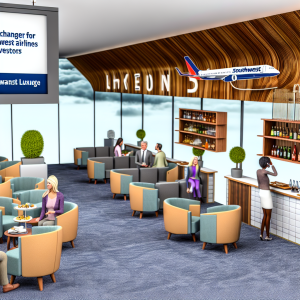Southwest Airlines is on the brink of a bold transformation that could redefine its market positioning and appeal to a broader spectrum of travelers—especially the high-spenders who have traditionally flown competitors. For decades, Southwest has been synonymous with no-frills, low-cost, friendly flying, famously offering open seating, free checked bags, and a uniform cabin experience. But as CEO Bob Jordan recently revealed, the airline is seriously considering introducing airport lounges, premium seating, and even long-haul international flights, moves that signal a strategic pivot to capture more lucrative customer segments.
Southwest’s Strategic Shift: Why Now?
Southwest’s traditional model has served it well for 54 years, but the airline industry landscape is evolving rapidly. Rivals like Delta, United, and American Airlines have doubled down on luxury offerings—expanding premium cabins, investing heavily in lounges, and targeting affluent leisure travelers with routes to upscale tourism destinations. For example, American Airlines just announced plans to nearly double its lounge space at Miami International Airport, aiming to provide a seamless, luxurious experience for its high-value customers.
Southwest’s CEO candidly acknowledged that the airline currently sends customers to competitors because it lacks these premium offerings. This is a critical insight: in a market where customer loyalty is often tied to perks like lounges and first-class seats, Southwest risks losing high-margin passengers to other carriers. The airline’s willingness to “do it the Southwest way” but not rule out these enhancements shows a pragmatic approach to balancing its low-cost roots with evolving customer expectations.
What This Means for Investors and Advisors
From an investment perspective, Southwest’s potential expansion into premium services and long-haul international flights could unlock new revenue streams and diversify its customer base. However, this transformation comes with risks. The airline must carefully manage the transition to avoid alienating its core customers who value simplicity and low costs. Moreover, investing in new aircraft capable of long-haul flights—likely wide-body jets, a departure from its Boeing 737 fleet—will require significant capital expenditure and operational adjustments.
Interestingly, Southwest’s move aligns with broader industry trends. According to the International Air Transport Association (IATA), premium travel segments are expected to grow faster than economy class over the next decade, fueled by rising disposable incomes in emerging markets and pent-up demand for luxury travel post-pandemic. Southwest entering this space could be a game-changer, especially if it leverages its reputation for customer service and operational efficiency.
Unique Insight: The Nashville Opportunity
One of the most compelling examples of Southwest’s potential premium market is Nashville International Airport, where the airline holds over 50% market share. Nashville is not just a music hub but an emerging luxury travel hotspot. Jordan highlighted that customers there are already expressing demand for lounges, first-class seating, and direct flights to Europe. This localized demand could serve as a testbed for Southwest’s premium initiatives, offering investors a tangible metric to watch for early signs of success.
What Should Investors and Advisors Do Now?
-
Monitor Fleet and Route Announcements: Watch for Southwest’s decisions on acquiring long-haul aircraft and launching international routes. These moves will be pivotal in assessing the airline’s commitment and execution risk.
-
Evaluate Competitive Positioning: As Southwest potentially encroaches on premium territory, compare its offerings and customer satisfaction metrics against established players like Delta and American. Improved premium services could increase Southwest’s market share among affluent travelers but might pressure margins initially.
-
Consider Broader Industry Trends: With airfare prices reportedly dropping and economic uncertainty lingering, Southwest’s strategy to offer both no-frills and premium options could provide a hedge against market volatility. Investors should gauge how well the airline balances these dual customer segments.
- Look for Partnership Expansion: Southwest’s existing international partnerships with Icelandair and China Airlines hint at a cautious but deliberate approach to global expansion. Additional alliances or codeshares could accelerate its international footprint without immediate heavy capital investment.
Forecast and What’s Next?
Southwest’s transformation is a story to watch closely in 2025 and beyond. If executed well, it could disrupt the U.S. airline market by blending low-cost efficiency with premium offerings—an elusive combination that many carriers struggle to achieve. However, the transition will require deft management of brand identity, customer expectations, and operational complexity.
For investors, this is a potential inflection point. Southwest could evolve from a purely domestic, budget-friendly carrier into a hybrid airline capable of competing on multiple fronts. Advisors should prepare clients for increased volatility in airline stocks but also for significant upside if Southwest successfully captures the growing premium travel segment.
In summary, Southwest’s openness to innovation—whether lounges, premium seats, or transatlantic flights—signals a willingness to adapt in a fiercely competitive market. This is not just about adding amenities; it’s about redefining value in air travel. Investors who keep a close eye on these developments and adjust their strategies accordingly will be best positioned to capitalize on what could be one of the most significant shifts in the airline industry in decades.
Sources:
- CNBC Interview with Southwest CEO Bob Jordan, 2025
- International Air Transport Association (IATA) Premium Travel Forecast, 2024
- American Airlines Miami Lounge Expansion Announcement, 2025
Stay tuned to Extreme Investor Network for the latest insights and actionable intelligence on this evolving story.
Source: Southwest airport lounges? CEO says carrier is open to high-end change

